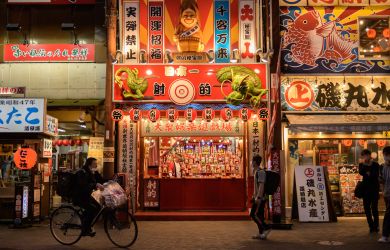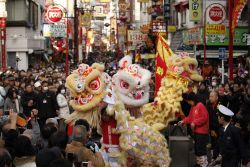
May 29, 2008
Jero Worship
Japan can’t get enough of the first African-American enka singer
By Metropolis
Originally published on metropolis.co.jp on May 2008

Photo by Jun Sato
There are some days that Jero could definitely use a few clones. Ever since the singer of traditional Japanese enka music made his debut, his life has been a constant whirlwind of promotional appearances, media interviews and radio and TV events. “Actually, I’m having fun and starting to get used to it, but I hardly have any time to myself to chill out,” he says, sitting back in the office of his management agency, Victor Entertainment, in Omotesando. Of course, the fact that Jero, 26, is the first African-American enka singer in Japanese music history—and that he infuses his music with hip-hop—has a lot to do with his skyrocketing fame since releasing his debut single, “Umiyuki,” on February 20.
Not too long ago, Jero was just plain old Jerome White, an English teacher in Wakayama. His connection to Japan stems from his Japanese grandmother, who married a US Navy man in Yokosuka. They went back to Pittsburgh and raised a family. Jero eventually came along in 1981, and credits his grandmother for the beginnings of his love of enka—she would regale him with the songs of such legendary artists as Hibari Misora and Sayuri Ishikawa.
“I was singing enka in Japanese to my grandmother before I was 10, even though I didn’t speak any Japanese and didn’t know the meaning of the lyrics. She was so pleased,” he recalls. “My friends didn’t have a Japanese grandmother like I did. I took great pride in that, and it made me want to learn more about her country and culture. Of course, growing up in Pittsburgh, I also listened to a lot of R&B and hip-hop. Yet in the back of my mind, I thought if there was ever a chance, I would love to become an enka singer. I knew that would be a long shot living in the States, so I kept it on the backburner.”
Jero’s first experience in Japan came when he spent two weeks here as the American representative in a Japanese speech contest at the age of 15. After finishing high school in the US, he returned as an exchange student at Kansai Gaidai University in Osaka for three months during his junior year. Jero then completed his degree in information science back in Pittsburgh, and decided to move to Japan permanently in 2003. He worked as a computer engineer and English teacher, but his music career didn’t seem to be going anywhere until he successfully auditioned for an NHK singing program. “From then on, I started entering a lot of karaoke contests. It was at one of those that I got scouted by Victor,” he says.
The young singer had already adopted the name Jero because that’s how his friends kept referring to him. After some vocal training, Victor decided it was time for him to try a single, and offered him the song “Umiyuki” (“Ocean Snow”), featuring music by Ryudo Uzaki and lyrics by Yasushi Akimoto, two veterans of the Japanese entertainment scene.
Its lyrics capture the loneliness of a brokenhearted woman in Izumozaki-machi, near the Sea of Japan in Niigata. The local government got into the act by providing a ¥500 subsidy for households to buy the CD, in the hopes of boosting tourism.
“I like the words of ‘Umiyuki’ a lot,” Jero says. “It’s a very good ballad. Something I try to keep in mind with any song I sing now is to become the person the song is about and keep the image in my head and try to convey those feelings to the audience.”
What surprised him, though, was when his management team suggested he keep the hip-hop look, and that he incorporate dance moves into “Umiyuki.” “At first, I didn’t want to do it because I was afraid people would think of it as a parody, me making fun of enka,” he says. “I was negative toward it, but after doing it and seeing the results, I’m glad that I did.”
After Jero wowed spectators with his song and dance movements at a CD release event at HMV Shibuya on February 20, “Umiyuki” soon became a cultural force, entering the Oricon singles chart at No. 4 and spawning a video that’s been viewed some 300,000 times on YouTube.
With Jero’s career successfully launched, the marketing blitz by Victor moved into high gear. “Currently, most of my days are filled up with promotions, going around Japan performing at shopping malls, local TV and radio shows, doing interviews. At least once or twice a week, I am traveling somewhere,” he says.
The big question is whether someone like Jero, with his trademark cap (he owns around 50), baggy pants and hip-hop moves, can reshape enka. “Actually, I don’t think I am reinventing the genre. Rather, I hope I am making it something new for younger people to listen to. I’m really just doing something that I loved to do since
I was a kid. Not being Japanese is why I am getting a lot of media attention. If I was just another young Japanese enka singer, it wouldn’t be this big. Still, I wish there could be more focus on the music and the songs rather than having people say ‘Americajin enka kashu.’”
As for his clothes, Jero says simply that’s a part of who he is. “I’ve been wearing hip-hop fashion since I was in high school. Now, if I were to wear a kimono on stage when I sang, no one would take me seriously… I don’t think I’d look good in a kimono anyway.”
Perhaps Jero is just what enka needs to revitalize itself; the genre has faded in popularity over the past decade despite the emergence of younger singers like Kiyoshi Hikawa. For older enka artists and their fans, the songs express nothing less than traditional values and the Japanese aesthetic. “I know there is a perception that enka is a form of music that only the older generation listen to; therefore, young people don’t listen to it and wouldn’t be interested in it,” Jero acknowledges. “On the other hand, I was young, I listened to it and I liked it. I knew it was something different but I never thought it was weird. I’m hoping more young people will start listening to it and like it, because if they don’t, then enka will probably fade out.”

Photo by Norihio Kawaguchi
As he blazes his own trail, Jero is mindful of the singers who have gone before him. “The first enka songs I was exposed to were those of Hibari Misora,” he says, referring to Japan’s most popular postwar singer, whose death at 52 in 1989 plunged the nation into mourning. “Anything she sang, she sang really well with power and emotion.”
One byproduct of his success is that it’s brought him closer to his idols. “I get the chance now to meet veteran enka singers, many of whom I have looked up to for a long time, and to be able to actually meet them and be on the same stage and TV shows with them is a real thrill. A lot of them are really happy that I came on the scene because they say I brought ‘genki’ to enka music. It’s given them a lot more power and motivation to keep going.”
Jero’s next milestone will be the June 25 release of his debut mini-album, Covers. “It features older enka songs. Some of the songs were picked by my fans through my blog; others were ones I wanted to sing. In all, there are seven songs, and the arrangements are different from the originals. For example, rock guitarist Marty Friedman plays on one of the tracks.” Jero adds that he’s considering a series of live shows. “First, I have to get more songs I can sing and then an original album before a tour.” A few years down the line when he is more established as an enka singer, he says that he would be happy to consider collaborating with a J-Pop or R&B singer. “I’ll be all ears, but don’t ask me to rap. I can’t rap at all.”
Jero certainly has a growing fan base, ranging from elementary school kids to older fans. But young women don’t go crazy over him just yet. “They are really excited to see me and want to take pictures with me, so I’m flattered,” says Jero. “Going out is still OK. It hasn’t gotten to the point where it is overwhelming with fans bothering me. I’m hoping it doesn’t get to that. Everyone is so respectful in Japan. Of course, you get a few people who try to take sneaky pictures, but most people come up to me and ask. I always wear my cap when I go out, so it’s hard not to be recognized.”
Jero is adding to his repertoire by currently appearing in his first TV commercial, for Kirin’s canned coffee drink Fire Cafe Zero. “That was fun; definitely a different experience. I have some dialogue in it and I sing. It’s funny how to make a 30-second commercial takes a whole day.”
He hopes to do more acting in the future. “The problem is I don’t have too much time. When I get a bit of time to myself, all I want to do is hang out at home. I like having friends over and playing video games, talking, drinking, whatever.”
A lot of Jero’s “downtime” on planes or the shinkansen is spent updating his blog. Despite his fluency in Japanese, Jero doesn’t have that much confidence in his linguistic ability. “For the amount of time I have been practicing, I should be able to speak a lot better. What’s worse is that some days I don’t even speak English anymore. The words don’t come out as quickly as they do in Japanese.” Staying healthy is another challenge. “About all I can do is eat three meals a day and take vitamins. Unfortunately, I don’t have time to do any exercise. I don’t smoke, and the staff don’t smoke around me.” Jero loves living in Japan and has no plans to go back to the States. “The only thing I dislike is that it is so far away from Pittsburgh. I haven’t been able to go back and visit my family. They haven’t been over here yet, but I am hoping.”
Jero has one other big hope. His grandmother passed away in 2005 and never got to see him sing in Japan. “I told her that I would strive to get on NHK’s Kohaku Uta Gassen for her,” he says, referring to the iconic New Year’s musical review. “I am hoping to do that this year,”
As his career kicks into gear, Jero says he is starting to get a sense of his destiny. “When I am onstage, I still get nervous, but I feel like this is what I have been brought here to do. When the day is done, and I am in my own space at home, I sit back and that’s when I feel at peace.”







